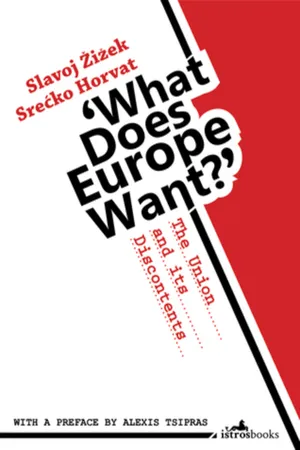WHAT DOES EUROPE WANT?
WHAT DOES EUROPE WANT?
The Union and its Discontents
SLAVOJ ŽIŽEK
SREĆKO HORVAT
First published in 2013 by
Istros Books
London, United Kingdom
www.istrosbooks.com
© Slavoj Žižek, 2013
© Srećko Horvat, 2013
Artwork & Design © Milos Miljkovich, 2013
Typeset by Octavo-Smith Ltd
The right of Srećko Horvat and Slavoj Žižek to be identified as the authors of their respective works has been asserted in accordance with the Copyright, Designs and Patents Act, 1988
ISBN: 978-1908236166 (print edition)
ISBN: 9781908236845 (eBook)
Printed in England by
CMP (UK), Poole, Dorset
www.cmp-uk.com
This edition has been made possible through the financial support granted by the Croatian Ministry of Culture.
CONTENTS
Foreword Alexis TsiprasThe Destruction of Greece as a Model for All of Europe. Is this the Future that Europe Deserves?
1. S. Žižek Breaking Our Eggs without the Omelette, from Cyprus to Greece.
2. S. Horvat Danke Deutschland!
3. S. Žižek When the Blind Are Leading the Blind, Democracy Is the Victim
4. S. Horvat Why the EU Needs Croatia More than Croatia Needs the EU
5. S. Žižek What Does Europe Want?
6. S. Horvat Are the Nazis Living on the Moon?
7. S. Žižek The Return of the Christian-conservative Revolution
8. S. Horvat In the Land of Blood and Money: Angelina Jolie and the Balkans
9. S. Žižek The Turkish March
10. S. Horvat: War and Peace in Europe: ‘Bei den Sorglosen’
11. S. Žižek Save Us from the Saviours: Europe and the Greeks
12. S. Horvat: ‘I’m Not Racist, but … The Blacks are Coming!’
13. S. Žižek Shoplifters of the World Unite
14. S. Horvat Do Markets Have Feelings?
15. S. Žižek The Courage to Cancel the Debt
16. S. Horvat The Easiest Way to the Gulag Is to Joke About the Gulag
17. S. Žižek We Need a Margaret Thatcher of the Left
18. A. Tsipras Europe Will Be Either Democratic and Social or It Will No Longer Exist (interview)
19. S. Žižek and A. Tsipras ‘The Role of the European Left’ (debate)
Notes
Alexis Tsipras
FOREWORD: THE DESTRUCTION OF GREECE AS A MODEL FOR ALL OF EUROPE.
IS THIS THE FUTURE THAT EUROPE DESERVES?
From the middle of the 1990s until almost the end of the first decade of the twenty-first century, Greece tended towards economic growth. The main characteristics of that growth were the very large and non-taxed profits enjoyed by the rich, along with over-indebtedness and the rising unemployment among the poor. Public money was stolen in numerous ways, and the economy was limited mainly to the consumption of imported goods from rich European countries. Rating agencies considered this model of ‘cheap money, cheap labour’ the model of dynamic emerging economies.
The Vicious Cycle of Depression
Everything, however, changed after the 2008 crisis. The cost of the bank losses that were created by uncontrolled speculation were transfered to national governments, which were in turn transferred to society at large. The flawed model of Greek development collapsed and the country was deprived of the opportunity to borrow, causing it to become dependent on the IMF and the European bank. And all this was accompanied by an extremely severe austerity programme.
This programme, which the Greek government adopted without proper debate, consists of two parts: ‘stabilisation’ and ‘reform’. The conditions of the programme are presented as positive, in order to cover up the huge social destruction it has caused. In Greece, the part of the programme named ‘stabilisation’ leads to indirect, destructive taxation, large cuts in public spending and the destruction of the welfare state, especially in the areas of health, education and social security, as well as the privatisation of basic social goods, such as water and energy. The programme which forms part of the ‘reform’ deals with the simplification of redundancy procedure, the elimination of collective agreements and the creation of ‘special economic zones’. This is accompanied by many other regulations designed to facilitate the investment of powerful and colonialist economic forces, without the inconvenience of, say, having to go all the way to South Sudan. These are just some of the conditions that are in the ‘Memorandum’, the contract that was signed by Greece with the IMF, the European Union and the European Central Bank.
These measures are naturally supposed to lead Greece out of the crisis. The strict ‘stabilisation’ programme should lead to budget surpluses, allowing the country to stop borrowing, while at the same time enabling it to pay off the debt. On the other hand, the ‘reforms’ are aimed at regaining market confidence, encouraging them to invest after witnessing the destroyed welfare state and the desperate, insecure and low-paid workers in the labour market. This would lead to new ‘development’; something which does not exist anywhere except in ‘holy books’ and the perverted minds of global neoliberalism.
It was assumed that the programme would be very effective and fast, and that Greece would soon be ‘reborn’ and back on the path of growth. But three years after the signing of the ‘Memorandum’, the situation is becoming worse. The economy is sinking further, and the taxes are obviously not collected, for the simple reason that the Greek citizens are unable to pay them. The reduction of spending has now reached the core of social integrity, creating the conditions of a humanitarian crisis. In other words, we are now talking about people who are reduced to eating rubbish and sleeping on the pavements, about pensioners who can not afford to buy bread, of households without electricity, of patients who are unable to afford medicine and treatment. And all this within the eurozone.
Investors, of course, do not come, given that the current bankruptcy option remains open. And of course, the authors of the ‘Memorandum’ after each tragic failure, react by imposing more taxes and more cuts. The Greek economy has entered a vicious cycle of uncontrolled depression that leads nowhere except to complete disaster.
Taliban Neoliberalism
The Greek ‘rescue’ plan (another convenient term used to describe this disaster) ignores a fundamental principle. The economy is like a cow: it eats grass and produces milk. It is inconceivable to take away a quarter of her grass and expect her to produce four times more milk. The cow will simply die. The same is now happening to the Greek economy.
The Greek Left realised, from the very first moment, that the austerity measures would not ‘cure’, but actually deepen the crisis. When someone is drowning, he needs to be thrown a lifeline, not a weight. For their part, the Taliban neoliberalists still assure us that things will improve. Yet even the most stupid among them must now know that this is a lie. But this stance is not nonsense, and it’s not dogmatism. The leaders of the IMF themselves recently stated that there is an error in the design of the Greek austerity programme, which is doomed to failure, and that the effects of the recession are completely out of control. And yet the programme continues with an unprecedented stubbornness and persistence, and the situation is becoming more and more difficult. The conclusion can only be that something else lies behind all this.
In fact, behind all this is the fact that pulling the Greek economy out of the crisis is not in the interests of Europe or the IMF. Much more important is the desire to remove, as the ultimate goal of the programme, what in post-war Europe became known as the ‘social contract’. The fact that Greece will be left bankrupt and riddled with social problems is not important. What is important, is that a eurozone country is openly discussing the introduction of a wage level comparative to that of the Chinese, along with the abolition of workers’ rights, the abolition of national insurance and the welfare state, and the total privatisation of utilities and public goods. Those neoliberal depraved minds, who already encountered violent resistance in European societies following the decade of the 1990s, now find their dream becoming a reality through the pretext of the crisis.
Greece is the first step. The debt crisis has already spread to other countries in southern Europe, and penetrates deeper into the heart of the European Union. Greece can serve as a case study. Anyone who is exposed to the speculative attacks of the markets has no other choice but to destroy the remnants of the welfare state, as has happened in Greece. Similar memoranda in Spain and Portugal have already introduced similar changes. But this strategy is fully revealed in the ‘European Pact for Stability’, which promotes Germany in place of the entire Union. Member states are no longer free to manage their own finances. The central institutions of the EU are allowed to intervene in budgets and impose tough fiscal measures to reduce deficits. This policy strongl...

